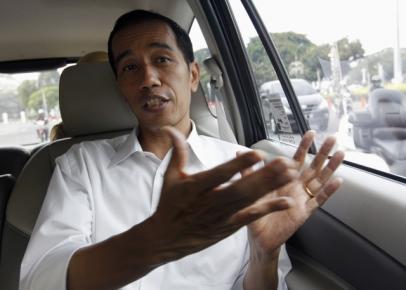New Indonesian President Can Bring Certainty, Consistency To
Bareksa • 25 Jul 2014

Jakarta's Governor Joko Widodo, also known as Jokowi, speaks during an interview with Reuters in his car on his way back to his office in Jakarta (REUTERS/Enny Nuraheni)
Certainly the new leader of the world's fourth-most populous nation is making the right noises.
Bareksa.com - The election of reformist Joko "Jokowi" Widodo as Indonesia's new president has spurred hopes of a rapprochement with global miners and the scaling back of some of the nationalistic resource policies.
Certainly the new leader of the world's fourth-most populous nation is making the right noises, telling Reuters in an interview published July 22 that he wants to sit down with mining companies and resolve differences.
And indeed this was followed by Freeport-McMoRan, which owns the giant Grasberg copper mine, saying it expects to "imminently" sign an agreement with Indonesia that will allow for the resumption of exports of copper concentrate.
Newmont Mining Corp also said it was close to a memorandum of understanding with the government that would allow it to resume exports of copper concentrate and re-open its Batu Hijau mine.
These negotiations with the two U.S. mining giants, which account for 97 percent of Indonesia's copper output, have been ongoing for months, so it's not clear that Jokowi had any influence on the talks, but equally his election victory may have provided momentum to the talks.
The dispute over copper has been around an export duty on copper concentrate, which was to be followed by a ban on exporting any unrefined copper in 2017.
The two U.S. companies are seeking a reduced export duty and financial incentives to build new copper smelting capacity.
While it appears a compromise is on the cards, copper isn't the main game in Indonesia and the resumption of exports won't have much impact on global markets.
Indonesia isn't among the top 10 copper producers in the world, ranking 13th in 2013, according to the U.S. Geological Survey.
If anything, Indonesian copper exports will add to the surplus market expected this year, putting downward pressure on prices, although this should be balanced against an improving demand outlook on faster Chinese and U.S. economic growth.
The commodities that may be more affected by Jokowi's victory in this month's presidential poll are nickel and bauxite.
Until the ban on exporting raw ores came into effect in January, Indonesia was the world's top exporter of bauxite, used to make alumina, and vied with the Philippines for top global nickel miner.
Since then, exports have plunged to virtually zero, a loss of about $500 million a month in dollar earnings, which is increasing the current account deficit at a time of rising macro-economic headwinds.
Jokowi may consider relaxing parts of the ban, if comments by Darmawan Prasodjo, an economic adviser to the new president, are taken at face value.
"If you want to build a smelter, what do you need? Well, for now, exports should be opened, and power stations need to be built to meet their electricity needs, with competitive rates," Prasodjo said.
However, this implies that miners will still have to be committed to building facilities to process ores in Indonesia, and any relaxation of the ban is likely only if firm building plans for smelters are in place.
END OF EXPORT BAN UNLIKELY SOON
This means that a resumption of nickel and bauxite exports is unlikely any time soon, given it will take several months for Jokowi's new administration to be in place, and possibly even longer to negotiate a secure coalition in parliament, where the parties backing the new president lack a majority.
London nickel prices have gained 37 percent so far this year as the market belatedly realised the Indonesian ore ban was for real, thus creating a structural shortage once Chinese stockpiles built up ahead of the export ban were used.
However, nickel is down nearly 11 percent from its 2014 peak in mid-May as the market realised that there was still plenty of nickel available and some of the 29 nickel-smelting projects in Indonesia may come onstream in time to prevent serious shortages.
The other area where Jokowi may seek to bring certainty is in coal, which accounts for some 85 percent of Indonesia's mineral earnings, making the Southeast Asian nation the world's top shipper of thermal coal for use in power plants.
Coal miners have complained about a lack of certainty over proposed changes to export royalties, production caps and domestic reservation policies.
It's also estimated that as much as 50 to 60 million tonnes of coal is exported illegally, compared to legal exports of around 400 million tonnes.
While Jokowi is unlikely to backtrack on the policy of adding value to mineral output, he may be able to bring more consistent policymaking and a more collaborative approach to the resource sector.
This alone would be a welcome change from the outgoing administration of President Susilo Bambang Yudhyono, but getting all the disparate interests and parties in Indonesia to pull in the same direction will be an enormous undertaking. (Source : Reuters)